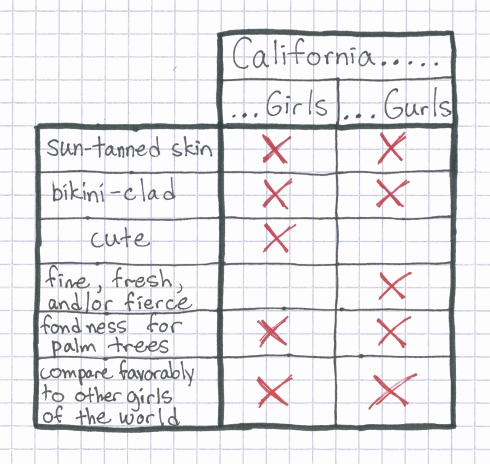Rock Charts
Charts, Graphs, and Other Random Stuff Based On Song Titles and Lyrics
Moving
Rock Charts is moving to tumblr. The interface is more suited to this kind of blog and I can easily share charts produced by others, as well as accept submissions and ideas from clever folks like you. I’ll keep this site up for a while — at least until I finish posting all the charts over there — but if you’ve enjoyed my work here, please come visit at http://rockcharts.tumblr.com
California Girls/Gurls
“California Girls” was released by the Beach Boys in 1965 and reached #3 on the Hot 100 chart. Brian Wilson claims to have written the music for the song during his first experiment with LSD. It is the first Beach Boys song to feature vocalist Bruce Johnston, who was filling in for Wilson at live shows.
The song was famously covered by David Lee Roth in 1985 (this version would also reach #3) and has been referenced by many other artists, including Gretchen Wilson’s 2005 answer song, which borrows the title (and little else) from the original.
Borrowing even more liberally, Katy Perry’s “California Gurls” (NOTE: Video is extremely suggestive) was released in 2010 and immediately clogged up the airwaves on its way to #1. The line “I wish they all could be California girls” was removed from the album version of the song after the Beach Boys threatened to sue.
I can’t find any decent covers of Perry’s version (perhaps because there is so little of value to work with), so here’s a pretty sweet Metallica mash-up.
Ain’t No Mountain High Enough
“Ain’t No Mountain High Enough” was written by prolific Motown duo Ashford & Simpson and originally recorded as a duet by Marvin Gaye and Tammi Terrell (although Terrell’s nerves prevented them from actually recording the song together; Gaye’s portion was added to hers later on). This version of the song reached #19.
Ashford & Simpson convinced Diana Ross to record the song as a solo, even though she had already done it as part of a Supremes/Temptations team-up. Motown chief Berry Gordy was not initially fond of the 6-minute drastic departure, but was eventually persuaded to release a shorter version of the recording, which promptly went to #1.

